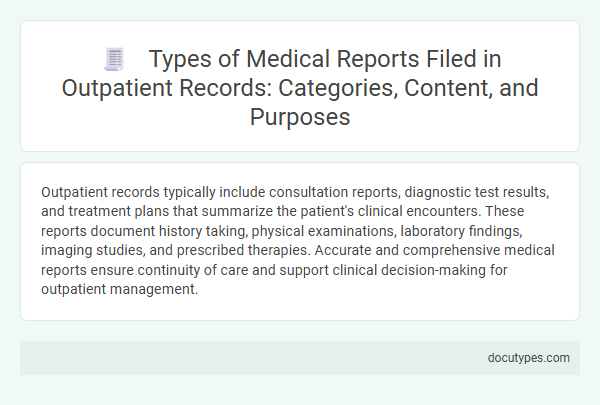Outpatient records typically include consultation reports, diagnostic test results, and treatment plans that summarize the patient's clinical encounters. These reports document history taking, physical examinations, laboratory findings, imaging studies, and prescribed therapies. Accurate and comprehensive medical reports ensure continuity of care and support clinical decision-making for outpatient management.
Introduction to Outpatient Medical Reports
What types of medical reports are commonly filed in outpatient records? Outpatient medical reports include clinical notes, diagnostic test results, and treatment plans. These documents provide a comprehensive view of a patient's evaluation and ongoing care outside hospital admission.
Classification of Medical Reports in Outpatient Records
Outpatient records encompass various types of medical reports that provide a detailed account of a patient's visit and treatment. Understanding the classification of these reports helps in organizing and retrieving critical information efficiently.
- Clinical Notes - Detailed observations made by healthcare providers during your outpatient visit, including symptoms and physical examination findings.
- Diagnostic Test Reports - Results from laboratory tests, imaging studies, and other diagnostic procedures conducted to assess the patient's condition.
- Prescription and Medication Records - Documentation of prescribed medications, dosages, and treatment plans tailored to your outpatient care.
Patient History and Initial Assessment Reports
| Type of Medical Report | Description |
|---|---|
| Patient History Report | This report documents your complete medical background, including past illnesses, surgeries, allergies, medications, family medical history, and lifestyle factors. It helps healthcare providers understand the context of your current health condition. |
| Initial Assessment Report | This report contains the clinical evaluation performed during your first outpatient visit. It includes vital signs, presenting symptoms, physical examination findings, and preliminary diagnosis. This report guides further diagnostic testing and treatment planning. |
Progress Notes and Follow-Up Documentation
Outpatient medical records primarily include progress notes and follow-up documentation to track patient care over time. These reports provide detailed insights into the patient's condition, treatment adjustments, and ongoing response to therapy.
- Progress Notes - These notes capture real-time updates on a patient's symptoms, clinical findings, and treatment responses during each outpatient visit.
- Follow-Up Documentation - This documentation records subsequent assessments, monitoring of treatment outcomes, and any modifications to care plans after the initial visit.
- Clinical Decision Support - Both progress notes and follow-up reports aid healthcare providers in making informed decisions based on longitudinal patient data and evolving health status.
Diagnostic Test and Laboratory Result Reports
Medical reports filed in outpatient records include various diagnostic test results and laboratory reports essential for accurate patient assessment. These documents provide critical information about your health status and guide clinical decision-making.
Diagnostic test reports detail findings from imaging, ECG, and other non-invasive procedures, offering insight into underlying conditions. Laboratory result reports present data from blood work, urine analysis, and other sample tests, which help confirm or rule out diagnoses.
Consultation and Specialist Evaluation Summaries
Outpatient records commonly include consultation reports that detail the patient's initial evaluation, presenting symptoms, and recommended treatment plans. Specialist evaluation summaries provide in-depth analysis from medical experts, highlighting diagnostic findings and expert opinions on complex conditions. You can rely on these documents to ensure continuity of care and informed decision-making throughout your treatment journey.
Procedure and Treatment Documentation
Outpatient records contain detailed medical reports that document various procedures and treatments performed during patient visits. These reports play a vital role in ensuring accurate clinical communication and continuity of care.
- Procedure Documentation - Describes specific medical or diagnostic procedures performed, including details such as date, type, and outcome.
- Treatment Plans - Outlines prescribed therapeutic interventions, medications, and follow-up instructions for ongoing patient management.
- Post-Procedure Notes - Provides observations and patient responses immediately following procedures to monitor recovery and identify complications.
Accurate procedure and treatment documentation in outpatient records supports effective clinical decision-making and enhances patient safety.
Discharge, Referral, and Transfer Reports
Outpatient records typically include several key types of medical reports that ensure continuity of care and clear communication among healthcare providers. Discharge reports summarize the patient's condition, treatment received, and follow-up instructions after an outpatient visit or procedure.
Referral reports are used to direct patients to specialists or other healthcare services, providing important clinical details and reasons for the referral. Transfer reports document the patient's movement from one healthcare setting to another, highlighting current treatments and necessary care plans to maintain seamless treatment.
Legal and Administrative Medical Reports
Outpatient records commonly include various types of medical reports essential for legal and administrative purposes. These reports document patient encounters and support healthcare decisions while ensuring compliance with regulatory standards.
Legal medical reports in outpatient records often consist of detailed injury assessments, consent forms, and documentation for disability claims. Administrative reports include referral letters, billing statements, and appointment summaries. Your accurate and thorough record-keeping in these reports safeguards legal integrity and streamlines healthcare management processes.
What Types of Medical Reports Are Filed in Outpatient Records? Infographic

